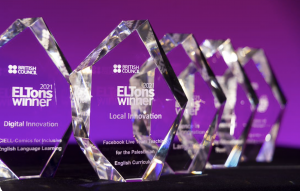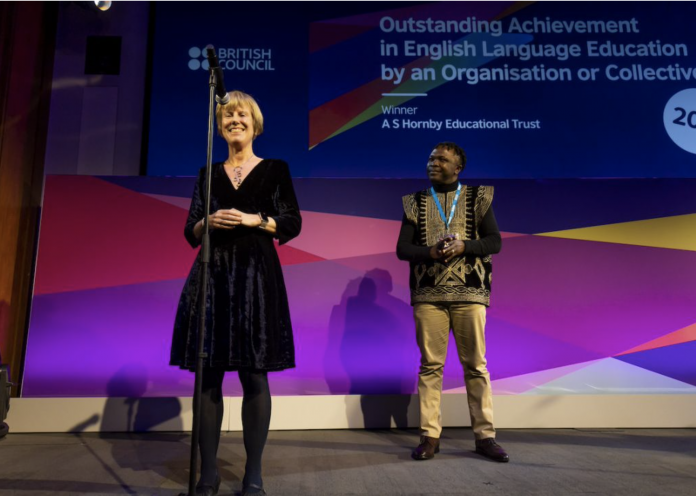This year’s shortlist has Melanie Butler singing its innovative praises
Innovating against the odds – that is the motto bestowed by the British Council on its 2022 ELTon Awards for innovation post-Covid, the nearest thing the English language profession has to the Oscars. Given the grim impact the pandemic has had on all sectors of education and the state of the world, the range of projects, making it onto the shortlist is indeed astonishing. And that shortlist is astonishingly international.
In the Digital Innovation category alone, we have an AI-based conversation app from Hungary, a free corpus app from Jiatong-Liverpool University and a kid’s gamified learning app from Mindojo which was developed in Israel, Ukraine, Azerbaijan, Italy, Russia and the USA.
Under Teacher Resources we find a book from Delta in Germany on pragmatics. The international theme is echoed across other categories too. Under local Innovation we find a community of teachers in Tanca, Peru, creating a collaborative space.
Viva los ELTons!
Latin America is having its own ELT revolution and this year the region dominates the category Excellence in Course Innovation.
From Mexico we have Brain Juice, a primary course which harnesses some of the sources which have powered this regional renaissance. From the Unicef Framework of Transferable Skills the publishers, University of Dayton Press, have picked Self- Awareness, Personal Autonomy and Artistic Expression. From the UN’s Sustainable Development Goals they have chosen not only Social Justice, but also Global and Environmental Awareness.
The three Brazilian courses on the shortlist echo these themes. Richmond Solution’s English Experience focuses in on global awareness; EXP Educational Intelligence (with Macmillan Education Brazil among its team of collaborators) focuses on self-awareness in its TransFor.Me Kids series; while May Moo and Me from StandFor/FTD Educação highlights emotional well-being.
Educators interested in these areas should take a look at Psychology in practice from Helbling Languages, shortlisted for a prize under the Teacher Resources category.
Again from Brazil, and also with a focus on socio-emotional
“There is the brilliantly named book, Breaking Through the Screen: Practical tips for Engaging Learners in the Online and Blended Classroom"
competence, we find a whole online language school, CNA Lab, under Innovation in Learner Resources. And for teachers still struggling with online classes, there is the brilliantly named resource book from National Geographic Learning, Breaking Through the Screen: Practical Tips for Engaging Learners in the Online and Blended Classroom.
Waving the flag for British publishing in the Course Innovation category, OUP’s Synchronize, aimed at Spanish secondary school pupils, also taps into the social psychology zeitgeist. Synchronize seems in many ways an enlightened, state-of-the-art course. It uses collaborative learning in a project-based course, engaging students with evidence-based approaches currently popular in mainstream education, while also offering teachers activities for the CEFR’s newish fifth skill, mediation.
Any new methodological innovation will need a new teachers’ resource book and Delta’s second shortlisted entry, Ideas in Action: Activities in Mediation, neatly fits the bill. Meanwhile, those in Brazil struggling with that other revolutionary concept, English as a lingua, should check under Local Innovation for Classroom Practices: English as a lingua franca, another entry from StandFor/FTD Educação.
Muddled by all this new-fangled methodology? To find out what approaches are proved to work there’s another resource book, An Introduction to Evidence-Based Teaching, by some of the Gazette’s favourite evidence-based gurus, Carol Lethaby, Russell Mayne and Patricia Harries.
Artistic license
Unicef’s Transferable Skills makes a strong showing for artistic expression and there are some serious contenders among the shortlisted resources that fill this hole in the market.
In the Innovation in Learner Resources section we have a brilliant, gritty whodunnit, Father and Son, from BBC Learning English (the first episode is amazing), which also provides interviews and features on drama roles.
In the same category is the second shortlisted entry from our favourite Austrian publisher, Helbling’s Shakespeare Series, which includes ‘From Reading to Performing’ sections and step-by-step instructions on preparing learners for performance.
For those looking for a more academic approach, Lift, the second entry from National Geographic Learning, explores world literature and non-fiction.
But it’s under the category of Local Innovation that artistic expression really comes to the fore. From the UK, Picture This!, from Learning Unlimited with Fotosynthesis, is a programme where adult ESOL learners mix participatory photography with English language lessons.
From Greece we have Famous Talking Portraits Museum, from Mary Doulgeri, where sixth-grade students made portraits that actually speak. And from Malaysia we find Dau Dau, a project from Keningau Vocational College with International House (IH) World and, with their second successful entry, Macmillan Education. The programme, which won the Simon Greenall Prize the year, encourages learners – including those with special needs – to explore their artistic interests and support them in exhibiting their work or performing in local festivals.
Shakespeare reappears
Meanwhile, back with the Bard comes Project W – Veterans, Volunteers and William, is a project created by Igor Kasian with The Ivano-Frankivsk National Drama Theatre and the British Embassy in Kyiv. A drama and theatre project, this aimed to support veterans of the traumatic 2014 war with Russia through staging productions of Twelfth Night. The project has been suspended following the recent Russian invasion. “Be that thou know’st thou art,” as Shakespeare wrote, “and then thou art as great as that thou fear’st.”
In recent years the ELTons have featured a number of winners which promoted social justice and environmental awareness. Indeed, a separate commendation for both these areas now features at the awards ceremony and once again this year EFL is going green.
Still going green
The two ‘green’ entries this year are both shortlisted for Excellence in Learner Resources. The UK’s Speakout for Sustainability (Pearson English with BBC Studios) was a five-month international project designed to involve both teachers and learners of English.
Italy has produced Helping Mother Nature Compost Faster: Using Chemistry to Transform Trash Into Treasure, authored by YL Teresa Ting and Lucia Stillo from the University of Calabria, with Giuseppina Barci from a local state school, Instituto Comprensivo Zumbini. This is a project-based CLIL course which uses the results of an astonishing local composting project which reduced composting times from weeks or even months to just eight hours to encourage students to think like scientists.
State schools are not the only ones championing innovation. We’ve already seen an online school in Brazil on the shortlist and IH World, mother house of UK teacher training, collaborating on a project.
Private language schools are gaining ground this year. In the Digital Innovation category, Swiss-based giant EF Education First, one of the pioneers of online English lessons, is shortlisted for EF Hyperclass, which gives online teachers their own virtual production studio designed to focus and guide students’ attention.

Another of the long-established school groups, International House, reappears in the digital universe with IH schools in Croatia, Romania and Bulgaria teaming up with Croatian further-education specialists Dante and Spanish-based Molehill Holdings to launch Virtual Reality for Language Learners (VR4LL), which allows students to explore exciting virtual worlds, including a desert island, an ice world and an ancient Roman city.
It seems, then, that this year’s ELTons herald a new phase in EFL. Not only one which harnesses digital media in a new and exciting way, but which adapts methodology to encompass everything from social psychology and artistic expression to adopting techniques such as collaborative learning and project-based curricula from the best of mainstream education.





